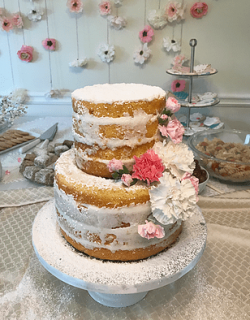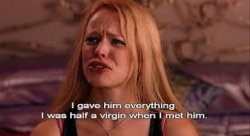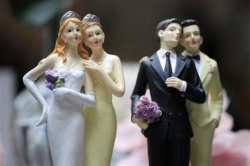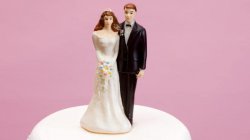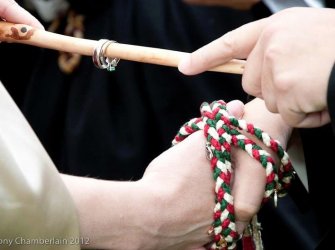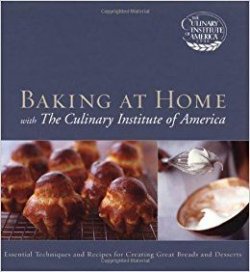If the supreme court says you need to pander to head hunting cannibals, that makes it right. Cause they say so.We all may reach a different conclusion. Please read the facts above. This case is in the US Supreme Court now.
Navigation
Install the app
How to install the app on iOS
Follow along with the video below to see how to install our site as a web app on your home screen.

Note: This feature currently requires accessing the site using the built-in Safari browser.
More options
You are using an out of date browser. It may not display this or other websites correctly.
You should upgrade or use an alternative browser.
You should upgrade or use an alternative browser.
Did Masterpiece Cakeshop Violate Public Accomodations Law? re: wedding cake
- Thread starter AZGAL
- Start date
- Thread starter
- #62

The difference between forcing a bakery to sell a cake to a same-sex couple, and forcing it to make one
To the editor: The article frames Colorado bakery Masterpiece Cakeshop Ltd. as seeking permission to discriminate. ("Corporations keep claiming 'We the People' rights. And they're winning," Opinion, March 2)
I agree it would be discrimination if it was a cake that had already been made. However, the baker is being asked to create the cake, and it is a cake to be used in a ceremony that violates his religious beliefs.
Advertisement
Would a Jewish baker be required to create a cake for a Nazi event? Would a black baker be required to create a cake for the Ku Klux Klan? Is an artist required to paint a portrait of someone he or she does not like?
Surely there are other bakers who would accommodate the couple's request, and insisting that this particular baker do it appears to be a spiteful act.
- Thread starter
- #64
[URL='https://www.denverpost.com/politics/local/'][URL='https://www.denverpost.com/politics/national/'][URL='http://thecannabist.co/'][URL='https://www.denverpost.com/classifieds/'][URL='https://www.denverpost.com/classifieds/'][URL='http://www.denverpost.com/classifieds/'][URL='http://www.denverpost.com/realestate'][URL='https://www.denverpost.com/jobs/'][URL='https://www.gomnlt.com/dfm/denverpost/?utm_source=denverpost&utm_medium=navweblink&utm_campaign=dfm'][URL='http://video.denverpost.com/'][URL='https://www.denverpost.com/']The Denver Post [/URL][/URL][/URL][/URL][/URL][/URL][/URL][/URL][/URL][/URL][/URL]
Opinion
Perspective
More wrongs than rights in Masterpiece Cakeshop case
Share this:
By George F. Will | Washington Post Writers Group
PUBLISHED: December 2, 2017 at 6:00 pm | UPDATED: December 4, 2017 at 9:43 am
The conversation about a cake lasted less than a minute but will long reverberate in constitutional law. On Tuesday, the Supreme Court is scheduled to hear 60 minutes of speech about when, if at all, making a cake counts as constitutionally protected speech and, if so, what the implications are for the Colorado Civil Rights Commission’s contention that Jack Phillips violated the state’s law against sexual-orientation discrimination.
Phillips, 61, is a devout Christian and proprietor of Masterpiece Cakeshop in Lakewood, where he works as — his description — a cake artist. Charlie Craig and David Mullins entered his shop to order a cake to celebrate their wedding. Phillips said that although he would gladly make cakes for gay people for birthdays or other celebrations, he disapproves of same-sex marriage on religious grounds, and so does not make cakes for such celebrations. (He also refuses, for religious reasons, to make Halloween cakes.) To be compelled to do so would, he says, violate his constitutional right to speak freely. This, he says, includes the right not to be compelled to contribute his expressive cake artistry to a ceremony or occasion celebrating ideas or practices he does not condone. Well.
The First Amendment speaks of speech; its presence in a political document establishes its core purpose as the protection of speech intended for public persuasion. The amendment has, however, been rightly construed broadly to protect many expressive activities. Many, but there must be limits.
ADVERTISING
Phillips was neither asked nor required to attend, let alone participate in, the wedding. Same-sex marriage was not yet legal in Colorado, so Craig and Mullins were to be married in Massachusetts. The cake was for a subsequent reception in Denver. But even if the cake were to have been consumed at a wedding, Phillips’ creation of the cake before the ceremony would not have constituted participation in any meaningful sense.
Six decades ago, the civil rights movement gained momentum through heroic acts of civil disobedience by African-Americans whose sit-ins at lunch counters, and other challenges to segregation in commerce, produced the “public accommodations” section of the 1964 Civil Rights Act. It established the principle that those who open their doors for business must serve all who enter. That principle would become quite porous were it suspended whenever someone claimed his or her conduct was speech expressing an idea, and therefore created a constitutional exemption from a valid and neutral law of general applicability.
Photography is inherently a creative, expressive art, so photographers have a strong case against compulsory documentation of ceremonies at which they must be present. Less clearly but plausibly, florists can claim aesthetic expression in floral arrangements, but their work is done before wedding ceremonies occur. Chauffeurs facilitate ceremonies, but First Amendment jurisprudence would become incoherent if it protected unwilling chauffeurs from their supposedly expressive participation in ceremonies to which they deliver actual participants.
It is difficult to formulate a limiting principle that draws a bright line distinguishing essentially expressive conduct from conduct with incidental or negligible expressive possibilities. Nevertheless, it can be easy to identify some things that clearly are on one side of the line or the other. So, regarding Phillips’ creations:
A cake can be a medium for creativity; hence, in some not-too-expansive sense, it can be food for thought. However, it certainly, and primarily, is food. And the creator’s involvement with it ends when he sends it away to those who consume it. Phillips ought to lose this case. But Craig and Mullins, who sought his punishment, have behaved abominably.
To make his vocation compatible with his convictions and Colorado law, Phillips has stopped making wedding cakes, which was his principal pleasure and 40 percent of his business. He now has only four employees, down from 10. Craig and Mullins, who have caused him serious financial loss and emotional distress, might be feeling virtuous for having done so. But siccing the government on him was nasty.
Denver has many bakers who, not having Phillips’ scruples, would have unhesitatingly supplied the cake they desired. So, it was not necessary for Craig’s and Mullins’ satisfaction as consumers to submit Phillips to government coercion. Evidently, however, it was necessary for their satisfaction as asserters of their rights as a same-sex couple.
Phillips’ obedience to his religious convictions neither expressed animus toward them nor injured them nor seriously inconvenienced them. Their side’s sweeping victory in the struggle over gay rights has been decisive, and now less bullying and more magnanimity from the victors would be seemly.
Email Washington Post columnist George F. Will at online or check out our guidelines for how to submit by email or mail.
Opinion
Perspective
More wrongs than rights in Masterpiece Cakeshop case
Share this:
By George F. Will | Washington Post Writers Group
PUBLISHED: December 2, 2017 at 6:00 pm | UPDATED: December 4, 2017 at 9:43 am
The conversation about a cake lasted less than a minute but will long reverberate in constitutional law. On Tuesday, the Supreme Court is scheduled to hear 60 minutes of speech about when, if at all, making a cake counts as constitutionally protected speech and, if so, what the implications are for the Colorado Civil Rights Commission’s contention that Jack Phillips violated the state’s law against sexual-orientation discrimination.
Phillips, 61, is a devout Christian and proprietor of Masterpiece Cakeshop in Lakewood, where he works as — his description — a cake artist. Charlie Craig and David Mullins entered his shop to order a cake to celebrate their wedding. Phillips said that although he would gladly make cakes for gay people for birthdays or other celebrations, he disapproves of same-sex marriage on religious grounds, and so does not make cakes for such celebrations. (He also refuses, for religious reasons, to make Halloween cakes.) To be compelled to do so would, he says, violate his constitutional right to speak freely. This, he says, includes the right not to be compelled to contribute his expressive cake artistry to a ceremony or occasion celebrating ideas or practices he does not condone. Well.
The First Amendment speaks of speech; its presence in a political document establishes its core purpose as the protection of speech intended for public persuasion. The amendment has, however, been rightly construed broadly to protect many expressive activities. Many, but there must be limits.
ADVERTISING
Phillips was neither asked nor required to attend, let alone participate in, the wedding. Same-sex marriage was not yet legal in Colorado, so Craig and Mullins were to be married in Massachusetts. The cake was for a subsequent reception in Denver. But even if the cake were to have been consumed at a wedding, Phillips’ creation of the cake before the ceremony would not have constituted participation in any meaningful sense.
Six decades ago, the civil rights movement gained momentum through heroic acts of civil disobedience by African-Americans whose sit-ins at lunch counters, and other challenges to segregation in commerce, produced the “public accommodations” section of the 1964 Civil Rights Act. It established the principle that those who open their doors for business must serve all who enter. That principle would become quite porous were it suspended whenever someone claimed his or her conduct was speech expressing an idea, and therefore created a constitutional exemption from a valid and neutral law of general applicability.
Photography is inherently a creative, expressive art, so photographers have a strong case against compulsory documentation of ceremonies at which they must be present. Less clearly but plausibly, florists can claim aesthetic expression in floral arrangements, but their work is done before wedding ceremonies occur. Chauffeurs facilitate ceremonies, but First Amendment jurisprudence would become incoherent if it protected unwilling chauffeurs from their supposedly expressive participation in ceremonies to which they deliver actual participants.
It is difficult to formulate a limiting principle that draws a bright line distinguishing essentially expressive conduct from conduct with incidental or negligible expressive possibilities. Nevertheless, it can be easy to identify some things that clearly are on one side of the line or the other. So, regarding Phillips’ creations:
A cake can be a medium for creativity; hence, in some not-too-expansive sense, it can be food for thought. However, it certainly, and primarily, is food. And the creator’s involvement with it ends when he sends it away to those who consume it. Phillips ought to lose this case. But Craig and Mullins, who sought his punishment, have behaved abominably.
To make his vocation compatible with his convictions and Colorado law, Phillips has stopped making wedding cakes, which was his principal pleasure and 40 percent of his business. He now has only four employees, down from 10. Craig and Mullins, who have caused him serious financial loss and emotional distress, might be feeling virtuous for having done so. But siccing the government on him was nasty.
Denver has many bakers who, not having Phillips’ scruples, would have unhesitatingly supplied the cake they desired. So, it was not necessary for Craig’s and Mullins’ satisfaction as consumers to submit Phillips to government coercion. Evidently, however, it was necessary for their satisfaction as asserters of their rights as a same-sex couple.
Phillips’ obedience to his religious convictions neither expressed animus toward them nor injured them nor seriously inconvenienced them. Their side’s sweeping victory in the struggle over gay rights has been decisive, and now less bullying and more magnanimity from the victors would be seemly.
Email Washington Post columnist George F. Will at online or check out our guidelines for how to submit by email or mail.
Would a Jewish baker be required to create a cake for a Nazi event?
No. Nazi's aren't a race, religion, sex, national origin, sexual orientation, marital status, or veterans status which are the class under Colorado Public Accommodation law.
Would a black baker be required to create a cake for the Ku Klux Klan?
No. The KKK isn't a race, religion, sex, national origin, sexual orientation, marital status, or veterans status which are the class under Colorado Public Accommodation law.
Is an artist required to paint a portrait of someone he or she does not like?
Nope. No law requires portrait painting for someone you don't like.
However they if they are a run a business subject to Colorado Public Accommodation law, then they can't refuse because of race, religion, sex, national origin, sexual orientation, marital status, or veterans status which are the class under Colorado Public Accommodation law. If they say, "hey, I don't like you" that is fine. However if they say "I won't paint portraits of Jew's." then they are subject to the law.
Of course this would be apply to for profit businesses. Different then an individual taking contract work. I've done contract work in database development before. I didn't own a business for the subject, I was just hired by a firm to develop a specialized database as an independent contractor for that work as a side to my regular job with a different employer. Since I wasn't a Public Accommodation business, those laws would not have applied.
>>>>
If they say, "hey, I don't like you" that is fine. However if they say "I won't paint portraits of Jew's." then they are subject to the law.
Which is the key to all of this, and why, at its core, it IS a first amendment issue. You highlight the point succinctly: The crime of the bigoted bakers isn't their refusal to bake a cake. They could easily claim a bogus reason, or simply refuse to offer one. Their crime is refusing to bake a cake as a form of protest. Protected classes legislation targets unpopular opinions for suppression by the state.
- Thread starter
- #67
A "wedding" is NOT any of the protected "classes" mentioned in Colorado "law" either and Jack Phillips, a creative artist REFUSED to supply a self DESIGNED original ART wedding cake for a WEDDING. ARTISTS accept and refuse a COMMISIONED piece of ART as they see fit since they are the creators of that art. He serves many types of clients, yet he refuses to create commissioned pieces of artwork that could suggest his support for activities that deeply offend him according to his sincerely held religious principles ( such as Halloween cakes). IN ADDITION, he was not in the middle of a contract for a commissioned cake as the "clients" acted in a disruptive and angry manner in HIS cake shop, walked out after cursing him, which shows that they were not there to peacefully negotiate a contract, but indeed cleverly STAGED a protest at a convenient TARGETED Christian baker in a state that had NO gay marriage at the time. This looks like a HATE crime against a Christian who the Colorado "law" forgot to protect. THANKFULLY for all AMERICANS the US Constitution protects religion and speech most vigorously.
A "wedding" is NOT any of the protected "classes" mentioned in Colorado "law" either
Public Accommodation limits denying service based on certain characteristics of the people if that service is normally provided.
Try selling wedding cakes to white people (or use Christians) and refusing to sell the same cakes to black people (or use Hindus) and then argue that "wedding cakes" aren't a protected class. Let us know if anyone buys that.
and Jack Phillips, a creative artist REFUSED to supply a self DESIGNED original ART wedding cake for a WEDDING.
There was never any discussion of design. Mr. Phillips would have refused an already designed cake that is displays in the wedding section of his online catalog. There is no "creative artistry" in reproducing something you've already made.
IN ADDITION, he was not in the middle of a contract for a commissioned cake as the "clients" acted in a disruptive and angry manner in HIS cake shop, walked out after cursing him, which shows that they were not there to peacefully negotiate a contract, but indeed cleverly STAGED a protest at a convenient TARGETED Christian baker in a state that had NO gay marriage at the time.
And now you are just making shit up. What you describe did not happen and as a matter of fact Mr. Phillips agreed that they simply asked for a cake he refuse. To cite the facts of the case as presented before the Judge.
Findings of Fact
The following facts are undisputed
4. On July 19, 2012, Complainants Charlie Craig and David Mullins entered Masterpiece Cakeshop in the company of Mr. Craig’s mother, Deborah Munn.
5. Complainants sat down with Phillips at the cake consulting table. They introduced themselves as “David” and “Charlie” and said that they wanted a wedding cake for “our wedding.”
6. Phillips informed Complainants that he does not create wedding cakes for same-sex weddings. Phillips told the men, “I’ll make you birthday cakes, shower cakes, sell you cookies and brownies, I just don’t make cakes for same-sex weddings.”
7. Complainants immediately got up and left the store without further discussion with Phillips.
8. The whole conversation between Phillips and Complainants was very brief, with no discussion between the parties about what the cake would look like."
Craig and Mullins v. Masterpiece CakeShop - Decision
>>>>
- Thread starter
- #69
Politics & Policy
Christian Baker 1, Officious Bureaucrats 0
By Rich Lowry
June 5, 2018 6:30 AM
The Supreme Court slaps down the bias police — for their blatant bias.
In the closely watched Masterpiece Cakeshop case, the Supreme Court dealt a blow against the small-mindedness that so often characterizes the self-appointed minders of social justice in America.
The case involved a Christian baker in Colorado named Jack Phillips, who refused to create a wedding cake for a same-sex couple in 2012. The couple, Charlie Craig and David Mullins, reacted in characteristic 21st-century American style — they filed charges. They took their complaint to the Colorado Civil Rights Commission under a Colorado law forbidding discrimination on the basis of sexual orientation.
Jack Phillips lost before the commission, lost before an administrative law judge, and lost before the Colorado Court of Appeals. It fell to the Supreme Court to vindicate him, and none other than Justice Anthony Kennedy, who previously authored the national right to gay marriage, did it.
In his majority opinion, Kennedy homed in on the blatant bias of Colorado’s bias police, who apparently blanch at anything that doesn’t accord with their blinkered, thoughtless progressivism. Phillips was on the wrong side of history, and so his rights could be disregarded and trampled. The arc of the moral universe bends toward crushing all resistance.
Phillips is an unlikely totem of hate. He’s happy to serve gay couples. As he told Craig and Mullins, “I’ll make your birthday cakes, shower cakes, sell you cookies and brownies; I just don’t make cakes for same-sex weddings.”
At the same time that the Colorado Civil Rights Commission said Phillips couldn’t decline to bake a cake that violated his conscience, it upheld the right of bakers to refuse to bake cakes bearing anti-gay-marriage messages.
Yet, once Phillips was thrown before the Civil Rights Commission, he didn’t have a chance. Commissioners opined that he was welcome to his religious beliefs, just not to bring them into his business. One commissioner said that “freedom of religion has been used to justify all kinds of discrimination throughout history, whether it be slavery, whether it be the Holocaust.” Yes, religious freedom has much to answer for.
At the same time that the commission said Phillips couldn’t decline to bake a cake that violated his conscience, it upheld the right of bakers to refuse to bake cakes bearing anti-gay-marriage messages. The Colorado Civil Rights Commission is all in favor of conscience rights — so long as it agrees with their conscience.
Christian Baker 1, Officious Bureaucrats 0
By Rich Lowry
June 5, 2018 6:30 AM
The Supreme Court slaps down the bias police — for their blatant bias.
In the closely watched Masterpiece Cakeshop case, the Supreme Court dealt a blow against the small-mindedness that so often characterizes the self-appointed minders of social justice in America.
The case involved a Christian baker in Colorado named Jack Phillips, who refused to create a wedding cake for a same-sex couple in 2012. The couple, Charlie Craig and David Mullins, reacted in characteristic 21st-century American style — they filed charges. They took their complaint to the Colorado Civil Rights Commission under a Colorado law forbidding discrimination on the basis of sexual orientation.
Jack Phillips lost before the commission, lost before an administrative law judge, and lost before the Colorado Court of Appeals. It fell to the Supreme Court to vindicate him, and none other than Justice Anthony Kennedy, who previously authored the national right to gay marriage, did it.
In his majority opinion, Kennedy homed in on the blatant bias of Colorado’s bias police, who apparently blanch at anything that doesn’t accord with their blinkered, thoughtless progressivism. Phillips was on the wrong side of history, and so his rights could be disregarded and trampled. The arc of the moral universe bends toward crushing all resistance.
Phillips is an unlikely totem of hate. He’s happy to serve gay couples. As he told Craig and Mullins, “I’ll make your birthday cakes, shower cakes, sell you cookies and brownies; I just don’t make cakes for same-sex weddings.”
At the same time that the Colorado Civil Rights Commission said Phillips couldn’t decline to bake a cake that violated his conscience, it upheld the right of bakers to refuse to bake cakes bearing anti-gay-marriage messages.
Yet, once Phillips was thrown before the Civil Rights Commission, he didn’t have a chance. Commissioners opined that he was welcome to his religious beliefs, just not to bring them into his business. One commissioner said that “freedom of religion has been used to justify all kinds of discrimination throughout history, whether it be slavery, whether it be the Holocaust.” Yes, religious freedom has much to answer for.
At the same time that the commission said Phillips couldn’t decline to bake a cake that violated his conscience, it upheld the right of bakers to refuse to bake cakes bearing anti-gay-marriage messages. The Colorado Civil Rights Commission is all in favor of conscience rights — so long as it agrees with their conscience.

Last edited:
- Thread starter
- #70
PrawfsBlawg
"Where Intellectual Honesty Has (Almost Always) Trumped Partisanship Since 2005"
Monday, June 04, 2018
SCOTUS Term: The Scope of the Masterpiece Cakeshop Decision Will Be Determined by the Concurrences
Justice Kennedy’s majority opinion in Masterpiece Cakeshop is based on the religious animus of the Colorado Civil Rights Commission, and thus appears, at first blush, to be a narrow ruling. However, the evidence Justice Kennedy cites for religious animus could mean that the effects of this opinion extend far beyond the parties at issue. The scope of Matserpiece Cakeshop will depend on whether lower courts take the view of the Kagan/Breyer concurrence or of the Gorsuch/Alito concurrence.
notes, Justice Kennedy’s opinion is fairly incoherent, he successfully achieves a sizeable majority despite profound differences among the Justices. He also makes clear that clergy cannot be required to perform same-sex weddings, but that businesses must generally respect public accommodations laws. Justice Kennedy articulates – without much elaboration – significant principles to guide future cases. The concurrences, however, are better reasoned, more coherent, and more straightforward about grappling with the issues. Justices Gorsuch and Alito, and Justice Thomas, who also wrote separately, appear to believe that even a blank wedding cake is expressive and entitled to First Amendment protection. Justices Kagan and Breyer do not appear to share this view. Justice Kennedy has not tipped his hand either way, even with his “disparate consideration” comment. We must await further adjudication to resolve the scope of a state’s power to enact particular anti-discrimination laws that may compel expression.
One other note: Although I believe this case could have been decided using an O’Brien expressive conduct rationale, Justice Kennedy’s balancing style is not well suited to First Amendment jurisprudence. Justice Kennedy worries (justifiably) about the stigma to the LGBT community if sellers can refuse service for same-sex weddings. Stigma, however, is an impermissible consideration in First Amendment jurisprudence, just as offensiveness is. The real question is not how to balance the rights of different groups, but where the state’s power ends and our First Amendment rights begin. I currently find the concurrence of Justices Kagan and Breyer more convincing – but I would be interested to see how they might decide a case with actual writing on a cake.
(Cross posted at In a Crowded Theater.)
"Where Intellectual Honesty Has (Almost Always) Trumped Partisanship Since 2005"
Monday, June 04, 2018
SCOTUS Term: The Scope of the Masterpiece Cakeshop Decision Will Be Determined by the Concurrences
Justice Kennedy’s majority opinion in Masterpiece Cakeshop is based on the religious animus of the Colorado Civil Rights Commission, and thus appears, at first blush, to be a narrow ruling. However, the evidence Justice Kennedy cites for religious animus could mean that the effects of this opinion extend far beyond the parties at issue. The scope of Matserpiece Cakeshop will depend on whether lower courts take the view of the Kagan/Breyer concurrence or of the Gorsuch/Alito concurrence.
notes, Justice Kennedy’s opinion is fairly incoherent, he successfully achieves a sizeable majority despite profound differences among the Justices. He also makes clear that clergy cannot be required to perform same-sex weddings, but that businesses must generally respect public accommodations laws. Justice Kennedy articulates – without much elaboration – significant principles to guide future cases. The concurrences, however, are better reasoned, more coherent, and more straightforward about grappling with the issues. Justices Gorsuch and Alito, and Justice Thomas, who also wrote separately, appear to believe that even a blank wedding cake is expressive and entitled to First Amendment protection. Justices Kagan and Breyer do not appear to share this view. Justice Kennedy has not tipped his hand either way, even with his “disparate consideration” comment. We must await further adjudication to resolve the scope of a state’s power to enact particular anti-discrimination laws that may compel expression.
One other note: Although I believe this case could have been decided using an O’Brien expressive conduct rationale, Justice Kennedy’s balancing style is not well suited to First Amendment jurisprudence. Justice Kennedy worries (justifiably) about the stigma to the LGBT community if sellers can refuse service for same-sex weddings. Stigma, however, is an impermissible consideration in First Amendment jurisprudence, just as offensiveness is. The real question is not how to balance the rights of different groups, but where the state’s power ends and our First Amendment rights begin. I currently find the concurrence of Justices Kagan and Breyer more convincing – but I would be interested to see how they might decide a case with actual writing on a cake.
(Cross posted at In a Crowded Theater.)
task0778
Diamond Member
PrawfsBlawg
"Where Intellectual Honesty Has (Almost Always) Trumped Partisanship Since 2005"
Monday, June 04, 2018
SCOTUS Term: The Scope of the Masterpiece Cakeshop Decision Will Be Determined by the Concurrences
Justice Kennedy’s majority opinion in Masterpiece Cakeshop is based on the religious animus of the Colorado Civil Rights Commission, and thus appears, at first blush, to be a narrow ruling. However, the evidence Justice Kennedy cites for religious animus could mean that the effects of this opinion extend far beyond the parties at issue. The scope of Matserpiece Cakeshop will depend on whether lower courts take the view of the Kagan/Breyer concurrence or of the Gorsuch/Alito concurrence.
notes, Justice Kennedy’s opinion is fairly incoherent, he successfully achieves a sizeable majority despite profound differences among the Justices. He also makes clear that clergy cannot be required to perform same-sex weddings, but that businesses must generally respect public accommodations laws. Justice Kennedy articulates – without much elaboration – significant principles to guide future cases. The concurrences, however, are better reasoned, more coherent, and more straightforward about grappling with the issues. Justices Gorsuch and Alito, and Justice Thomas, who also wrote separately, appear to believe that even a blank wedding cake is expressive and entitled to First Amendment protection. Justices Kagan and Breyer do not appear to share this view. Justice Kennedy has not tipped his hand either way, even with his “disparate consideration” comment. We must await further adjudication to resolve the scope of a state’s power to enact particular anti-discrimination laws that may compel expression.
One other note: Although I believe this case could have been decided using an O’Brien expressive conduct rationale, Justice Kennedy’s balancing style is not well suited to First Amendment jurisprudence. Justice Kennedy worries (justifiably) about the stigma to the LGBT community if sellers can refuse service for same-sex weddings. Stigma, however, is an impermissible consideration in First Amendment jurisprudence, just as offensiveness is. The real question is not how to balance the rights of different groups, but where the state’s power ends and our First Amendment rights begin. I currently find the concurrence of Justices Kagan and Breyer more convincing – but I would be interested to see how they might decide a case with actual writing on a cake.
(Cross posted at In a Crowded Theater.)
It's a bit hard for me to understand how a blank wedding cake is expressive and entitled to First Amendment protection. And it's also hard for me to understand how a couple, same sex or not, would want a cake or anything else (pictures, flowers, whatev) done by someone who does not approve of their union. You're going to pay this person good money to do something he doesn't want to do for the most special occasion of your lives? Damn, aren't you taking this gay rights militancy thing a bit too far?
Cecilie1200
Diamond Member
PrawfsBlawg
"Where Intellectual Honesty Has (Almost Always) Trumped Partisanship Since 2005"
Monday, June 04, 2018
SCOTUS Term: The Scope of the Masterpiece Cakeshop Decision Will Be Determined by the Concurrences
Justice Kennedy’s majority opinion in Masterpiece Cakeshop is based on the religious animus of the Colorado Civil Rights Commission, and thus appears, at first blush, to be a narrow ruling. However, the evidence Justice Kennedy cites for religious animus could mean that the effects of this opinion extend far beyond the parties at issue. The scope of Matserpiece Cakeshop will depend on whether lower courts take the view of the Kagan/Breyer concurrence or of the Gorsuch/Alito concurrence.
notes, Justice Kennedy’s opinion is fairly incoherent, he successfully achieves a sizeable majority despite profound differences among the Justices. He also makes clear that clergy cannot be required to perform same-sex weddings, but that businesses must generally respect public accommodations laws. Justice Kennedy articulates – without much elaboration – significant principles to guide future cases. The concurrences, however, are better reasoned, more coherent, and more straightforward about grappling with the issues. Justices Gorsuch and Alito, and Justice Thomas, who also wrote separately, appear to believe that even a blank wedding cake is expressive and entitled to First Amendment protection. Justices Kagan and Breyer do not appear to share this view. Justice Kennedy has not tipped his hand either way, even with his “disparate consideration” comment. We must await further adjudication to resolve the scope of a state’s power to enact particular anti-discrimination laws that may compel expression.
One other note: Although I believe this case could have been decided using an O’Brien expressive conduct rationale, Justice Kennedy’s balancing style is not well suited to First Amendment jurisprudence. Justice Kennedy worries (justifiably) about the stigma to the LGBT community if sellers can refuse service for same-sex weddings. Stigma, however, is an impermissible consideration in First Amendment jurisprudence, just as offensiveness is. The real question is not how to balance the rights of different groups, but where the state’s power ends and our First Amendment rights begin. I currently find the concurrence of Justices Kagan and Breyer more convincing – but I would be interested to see how they might decide a case with actual writing on a cake.
(Cross posted at In a Crowded Theater.)
It's a bit hard for me to understand how a blank wedding cake is expressive and entitled to First Amendment protection. And it's also hard for me to understand how a couple, same sex or not, would want a cake or anything else (pictures, flowers, whatev) done by someone who does not approve of their union. You're going to pay this person good money to do something he doesn't want to do for the most special occasion of your lives? Damn, aren't you taking this gay rights militancy thing a bit too far?
Can you think of a better way to celebrate gay love than by grinding it in the face of people who disagree with it?
task0778
Diamond Member
PrawfsBlawg
"Where Intellectual Honesty Has (Almost Always) Trumped Partisanship Since 2005"
Monday, June 04, 2018
SCOTUS Term: The Scope of the Masterpiece Cakeshop Decision Will Be Determined by the Concurrences
Justice Kennedy’s majority opinion in Masterpiece Cakeshop is based on the religious animus of the Colorado Civil Rights Commission, and thus appears, at first blush, to be a narrow ruling. However, the evidence Justice Kennedy cites for religious animus could mean that the effects of this opinion extend far beyond the parties at issue. The scope of Matserpiece Cakeshop will depend on whether lower courts take the view of the Kagan/Breyer concurrence or of the Gorsuch/Alito concurrence.
notes, Justice Kennedy’s opinion is fairly incoherent, he successfully achieves a sizeable majority despite profound differences among the Justices. He also makes clear that clergy cannot be required to perform same-sex weddings, but that businesses must generally respect public accommodations laws. Justice Kennedy articulates – without much elaboration – significant principles to guide future cases. The concurrences, however, are better reasoned, more coherent, and more straightforward about grappling with the issues. Justices Gorsuch and Alito, and Justice Thomas, who also wrote separately, appear to believe that even a blank wedding cake is expressive and entitled to First Amendment protection. Justices Kagan and Breyer do not appear to share this view. Justice Kennedy has not tipped his hand either way, even with his “disparate consideration” comment. We must await further adjudication to resolve the scope of a state’s power to enact particular anti-discrimination laws that may compel expression.
One other note: Although I believe this case could have been decided using an O’Brien expressive conduct rationale, Justice Kennedy’s balancing style is not well suited to First Amendment jurisprudence. Justice Kennedy worries (justifiably) about the stigma to the LGBT community if sellers can refuse service for same-sex weddings. Stigma, however, is an impermissible consideration in First Amendment jurisprudence, just as offensiveness is. The real question is not how to balance the rights of different groups, but where the state’s power ends and our First Amendment rights begin. I currently find the concurrence of Justices Kagan and Breyer more convincing – but I would be interested to see how they might decide a case with actual writing on a cake.
(Cross posted at In a Crowded Theater.)
It's a bit hard for me to understand how a blank wedding cake is expressive and entitled to First Amendment protection. And it's also hard for me to understand how a couple, same sex or not, would want a cake or anything else (pictures, flowers, whatev) done by someone who does not approve of their union. You're going to pay this person good money to do something he doesn't want to do for the most special occasion of your lives? Damn, aren't you taking this gay rights militancy thing a bit too far?
Can you think of a better way to celebrate gay love than by grinding it in the face of people who disagree with it?
Let's just say it ain't helpful if you're trying to promote acceptance and tolerance for gay rights.
Cecilie1200
Diamond Member
PrawfsBlawg
"Where Intellectual Honesty Has (Almost Always) Trumped Partisanship Since 2005"
Monday, June 04, 2018
SCOTUS Term: The Scope of the Masterpiece Cakeshop Decision Will Be Determined by the Concurrences
Justice Kennedy’s majority opinion in Masterpiece Cakeshop is based on the religious animus of the Colorado Civil Rights Commission, and thus appears, at first blush, to be a narrow ruling. However, the evidence Justice Kennedy cites for religious animus could mean that the effects of this opinion extend far beyond the parties at issue. The scope of Matserpiece Cakeshop will depend on whether lower courts take the view of the Kagan/Breyer concurrence or of the Gorsuch/Alito concurrence.
notes, Justice Kennedy’s opinion is fairly incoherent, he successfully achieves a sizeable majority despite profound differences among the Justices. He also makes clear that clergy cannot be required to perform same-sex weddings, but that businesses must generally respect public accommodations laws. Justice Kennedy articulates – without much elaboration – significant principles to guide future cases. The concurrences, however, are better reasoned, more coherent, and more straightforward about grappling with the issues. Justices Gorsuch and Alito, and Justice Thomas, who also wrote separately, appear to believe that even a blank wedding cake is expressive and entitled to First Amendment protection. Justices Kagan and Breyer do not appear to share this view. Justice Kennedy has not tipped his hand either way, even with his “disparate consideration” comment. We must await further adjudication to resolve the scope of a state’s power to enact particular anti-discrimination laws that may compel expression.
One other note: Although I believe this case could have been decided using an O’Brien expressive conduct rationale, Justice Kennedy’s balancing style is not well suited to First Amendment jurisprudence. Justice Kennedy worries (justifiably) about the stigma to the LGBT community if sellers can refuse service for same-sex weddings. Stigma, however, is an impermissible consideration in First Amendment jurisprudence, just as offensiveness is. The real question is not how to balance the rights of different groups, but where the state’s power ends and our First Amendment rights begin. I currently find the concurrence of Justices Kagan and Breyer more convincing – but I would be interested to see how they might decide a case with actual writing on a cake.
(Cross posted at In a Crowded Theater.)
It's a bit hard for me to understand how a blank wedding cake is expressive and entitled to First Amendment protection. And it's also hard for me to understand how a couple, same sex or not, would want a cake or anything else (pictures, flowers, whatev) done by someone who does not approve of their union. You're going to pay this person good money to do something he doesn't want to do for the most special occasion of your lives? Damn, aren't you taking this gay rights militancy thing a bit too far?
Can you think of a better way to celebrate gay love than by grinding it in the face of people who disagree with it?
Let's just say it ain't helpful if you're trying to promote acceptance and tolerance for gay rights.
They aren't. They're trying to bludgeon and intimidate their opponents into silence.
task0778
Diamond Member
PrawfsBlawg
"Where Intellectual Honesty Has (Almost Always) Trumped Partisanship Since 2005"
Monday, June 04, 2018
SCOTUS Term: The Scope of the Masterpiece Cakeshop Decision Will Be Determined by the Concurrences
Justice Kennedy’s majority opinion in Masterpiece Cakeshop is based on the religious animus of the Colorado Civil Rights Commission, and thus appears, at first blush, to be a narrow ruling. However, the evidence Justice Kennedy cites for religious animus could mean that the effects of this opinion extend far beyond the parties at issue. The scope of Matserpiece Cakeshop will depend on whether lower courts take the view of the Kagan/Breyer concurrence or of the Gorsuch/Alito concurrence.
notes, Justice Kennedy’s opinion is fairly incoherent, he successfully achieves a sizeable majority despite profound differences among the Justices. He also makes clear that clergy cannot be required to perform same-sex weddings, but that businesses must generally respect public accommodations laws. Justice Kennedy articulates – without much elaboration – significant principles to guide future cases. The concurrences, however, are better reasoned, more coherent, and more straightforward about grappling with the issues. Justices Gorsuch and Alito, and Justice Thomas, who also wrote separately, appear to believe that even a blank wedding cake is expressive and entitled to First Amendment protection. Justices Kagan and Breyer do not appear to share this view. Justice Kennedy has not tipped his hand either way, even with his “disparate consideration” comment. We must await further adjudication to resolve the scope of a state’s power to enact particular anti-discrimination laws that may compel expression.
One other note: Although I believe this case could have been decided using an O’Brien expressive conduct rationale, Justice Kennedy’s balancing style is not well suited to First Amendment jurisprudence. Justice Kennedy worries (justifiably) about the stigma to the LGBT community if sellers can refuse service for same-sex weddings. Stigma, however, is an impermissible consideration in First Amendment jurisprudence, just as offensiveness is. The real question is not how to balance the rights of different groups, but where the state’s power ends and our First Amendment rights begin. I currently find the concurrence of Justices Kagan and Breyer more convincing – but I would be interested to see how they might decide a case with actual writing on a cake.
(Cross posted at In a Crowded Theater.)
It's a bit hard for me to understand how a blank wedding cake is expressive and entitled to First Amendment protection. And it's also hard for me to understand how a couple, same sex or not, would want a cake or anything else (pictures, flowers, whatev) done by someone who does not approve of their union. You're going to pay this person good money to do something he doesn't want to do for the most special occasion of your lives? Damn, aren't you taking this gay rights militancy thing a bit too far?
Can you think of a better way to celebrate gay love than by grinding it in the face of people who disagree with it?
Let's just say it ain't helpful if you're trying to promote acceptance and tolerance for gay rights.
They aren't. They're trying to bludgeon and intimidate their opponents into silence.
Kinda like Black Lives Matter, only it's Gay Rights Matter. They ain't making any new friends that way.
Cecilie1200
Diamond Member
PrawfsBlawg
"Where Intellectual Honesty Has (Almost Always) Trumped Partisanship Since 2005"
Monday, June 04, 2018
SCOTUS Term: The Scope of the Masterpiece Cakeshop Decision Will Be Determined by the Concurrences
Justice Kennedy’s majority opinion in Masterpiece Cakeshop is based on the religious animus of the Colorado Civil Rights Commission, and thus appears, at first blush, to be a narrow ruling. However, the evidence Justice Kennedy cites for religious animus could mean that the effects of this opinion extend far beyond the parties at issue. The scope of Matserpiece Cakeshop will depend on whether lower courts take the view of the Kagan/Breyer concurrence or of the Gorsuch/Alito concurrence.
notes, Justice Kennedy’s opinion is fairly incoherent, he successfully achieves a sizeable majority despite profound differences among the Justices. He also makes clear that clergy cannot be required to perform same-sex weddings, but that businesses must generally respect public accommodations laws. Justice Kennedy articulates – without much elaboration – significant principles to guide future cases. The concurrences, however, are better reasoned, more coherent, and more straightforward about grappling with the issues. Justices Gorsuch and Alito, and Justice Thomas, who also wrote separately, appear to believe that even a blank wedding cake is expressive and entitled to First Amendment protection. Justices Kagan and Breyer do not appear to share this view. Justice Kennedy has not tipped his hand either way, even with his “disparate consideration” comment. We must await further adjudication to resolve the scope of a state’s power to enact particular anti-discrimination laws that may compel expression.
One other note: Although I believe this case could have been decided using an O’Brien expressive conduct rationale, Justice Kennedy’s balancing style is not well suited to First Amendment jurisprudence. Justice Kennedy worries (justifiably) about the stigma to the LGBT community if sellers can refuse service for same-sex weddings. Stigma, however, is an impermissible consideration in First Amendment jurisprudence, just as offensiveness is. The real question is not how to balance the rights of different groups, but where the state’s power ends and our First Amendment rights begin. I currently find the concurrence of Justices Kagan and Breyer more convincing – but I would be interested to see how they might decide a case with actual writing on a cake.
(Cross posted at In a Crowded Theater.)
It's a bit hard for me to understand how a blank wedding cake is expressive and entitled to First Amendment protection. And it's also hard for me to understand how a couple, same sex or not, would want a cake or anything else (pictures, flowers, whatev) done by someone who does not approve of their union. You're going to pay this person good money to do something he doesn't want to do for the most special occasion of your lives? Damn, aren't you taking this gay rights militancy thing a bit too far?
Can you think of a better way to celebrate gay love than by grinding it in the face of people who disagree with it?
Let's just say it ain't helpful if you're trying to promote acceptance and tolerance for gay rights.
They aren't. They're trying to bludgeon and intimidate their opponents into silence.
Kinda like Black Lives Matter, only it's Gay Rights Matter. They ain't making any new friends that way.
People who are that convinced of their personal rectitude rarely do, and rarely care.
- Thread starter
- #78
- Thread starter
- #79

Elizabeth Clark Guest
Posted Wed, June 6th, 2018 11:36 am
Bio & Post Archive »
Symposium: And the winner is … pluralism?
Posted Wed, June 6th, 2018 11:36 am by Elizabeth Clark
Elizabeth A. Clark is Associate Director of the International Center for Law and Religion Studies at Brigham Young University’s J. Reuben Clark Law School. She joined an amicus brief of 34 legal scholars in support of the cakeshop in this case.
Similar threads
- Replies
- 11
- Views
- 617
- Replies
- 431
- Views
- 7K
Latest Discussions
- Replies
- 10
- Views
- 42
- Replies
- 129
- Views
- 852
- Replies
- 3
- Views
- 21
- Replies
- 35
- Views
- 499
Forum List
-
-
-
-
-
Political Satire 8037
-
-
-
-
-
-
-
-
-
-
-
-
-
-
-
-
-
-
-
ObamaCare 781
-
-
-
-
-
-
-
-
-
-
-
Member Usernotes 468
-
-
-
-
-
-
-
-
-
-
